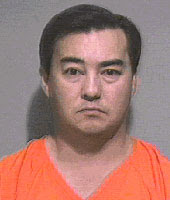Monday, May 18, 2009
Don’t Tase Me, Big Bro!

With respect to the use of stun guns to administer electro-shock trauma to small children, the State and its agents apply a sliding scale of official charges and punishments.
When a police officer subdues a child as young as five years of age by treating him to a 50,000-volt shock, this is a
law enforcement decision that will be the subject of an official review.Sure, the officer’s actions will eventually be vindicated, but in the interest of good public relations the officer, his superiors, and the local media have to undergo an intricate ritual, as stylized as Kabuki theater, before announcing the official inquiry’s foregone conclusion.
When a group of Florida prison guards subject scores of children, ranging in age from 5 to 17, to 50,000-volt shocks as a kind of bizarre prank, this is a lapse of judgment that may have adverse career consequences — up to and including termination — but no criminal charges or intervention by the Department of Children and Families.On more than a few occasions, as I’ve read about or seen coverage of the use of Tasers and similar portable agonizers on young children, I’ve been forced to exclaim, “Do those people have children of their own?!” Well, at least some of them do, and see nothing amiss in cajoling them into receiving a couple of Pavlovian shocks. And so the public memory is refreshed with another illustration of the fact that government “service” selects for a personality type in which stupidity and sadism are unusually salient traits.
In one of the “playful” incidents, children were arranged in a circle holding hands so that they could share the charge when one of them was shocked. At another prison, children were shocked individually by having a stun gun pressed against their bodies. At least two of the kids were sent “sprawling to the floor, crying out in pain and clutching at agonizing burns on their arms,” and one of them ended up in the hospital.
One would expect that criminal charges would ensue as a result of those incidents. One would be wrong. Three employees — Lt. Russell Bourgault and Sgt. Walter Schmidt, 14-year veterans of the prison system, and six-yet vet Sgt. Charmaine Davis — were fired. Maj. Seth Adams, a 19-year veteran, and Lt. P.J. Weisner, who had 11 years in the system, resigned. According to news reports, an additional 16 employees face unspecified “discipline.”
Thus far, however, there are no pending criminal charges, and the Florida State Department of Children and Family Services (CFS), one of the nation’s most energetic child-snatching bureaucracies (it produced Janet Reno, remember), has shown no interest in separating the injured children from their parents. This is a remarkably restrained official reaction, one likely influenced by the fact that the parents involved in this scandal are or were government employees.
On the other hand, when a privately employed father dealing with a misbehaving 14-year-old son decides to eschew the belt in favor of a home-made electric stun gun, this is an act of felony child abuse and domestic battery worthy of the full punitive attention of the state law enforcement apparatus.

Is there some special significance to the fact that all of these incidents involving the electro-shock of children took place in Florida, a state where more than a few children have perished in “boot camps” for juvenile offenders? I take note of that fact without venturing an explanation.
Police “resource officers” stationed in that state’s public schools have used Tasers — the full-fledged, consistently lethal instrument, not the relatively low-yield stun guns used in the last two examples — on kindergarten-age children with impunity on the assumption that the Taser is a relatively safe and humane implement of pain compliance.
So it may have been inevitable that a Florida entrepreneur would make a stun gun available to parents on the assumption that a mild jolt of electricity would be a safer and more effective corrective than any of the more familiar modes of administering corporal punishment. In 2003, a massage therapist from Boca Raton named Steve Robnor devised and marketed a device called the B-Stik, a billy club-shaped implement designed to deliver a brief shock — of roughly the same intensity as a bee sting — to an unruly child.
Robnor insisted that the B-Stik would leave no lasting marks, and do no significant harm. “It’s a safer alternative for people who physically discipline their children,” Robnor insisted. “Children should not be subjected to conventional physical discipline methods that have proven harmful. This product will enable a parent or caregiver to physically correct a child’s misbehavior safely, effectively, and most of all, responsibly.”
According to Robnor, his kiddie-prod actually removed the risk of “overdoing” physical discipline (and had other massage-related applications as well). Leaving aside the merits — such as they are — of Robnor’s product, it’s important to recognize that much of his sales patter reflected the views of the Florida state child-snatcher bureaucracy, and capitalized on a market niche they probably helped to create.
At the time the B-Stik was introduced, the official position of the Florida Department of Child and Family Services was that spanking of any kind and duration was to be discouraged and dealt with as potential abuse. “No child needs a spanking,” sniffed CFS spokeswoman Marilyn Munoz. “Spanking can be dangerous. You never know when a child can be harmed if a parent loses control. Children don’t need to be hit in order to be taught how to behave.” As far as the CFS was concerned, shocking a child with a low-intensity cattle prod, while not desirable, was no worse than a conventional spanking.

At least one Florida parent took that idea to heart. In 2005, 40-year-old Douglas Dycus was “hotlined” to the CFS and arrested for using a cattle prod-style stun gun to discipline his 14-year-old son. According to Dycus, he was frequently frustrated by the inattentiveness of his teenage son — a problem familiar to parents of teenagers everywhere. On one evening, as the family prepared to leave for an engagement, the 14-year-old was “wrestling” with a younger brother and refusing to obey instructions that he stop scuffling and get in the car.
So Dycus retrieved a small stunning device, and applied it to the upper arm of his son, with two predictable results: The youngster let out a sharp yelp, and then he got into the car.
A case of this sort being irresistible to tabloid media of all varieties, Dycus’s attorney, Richard Kibbey, soon turned up on Joe Scarborough’s old MSNBC evening program. Kibbey offered a two-pronged defense of Dycus’s actions: First, the innate right of parents to discipline their children includes the use of appropriate physical chastisement; and second, that the means employed by Dycus were much milder than those used, with increasing frequency, by police who employ Tasers when dealing with unruly schoolchildren.
“Some parents can reprimand a child and get order,” Kibbey pointed out. “Some parents need to slap or spank a child to get order. Some parents need to use a belt. Police and court systems should not be second-guessing a parent unless it involves torture or [physical punishment] for no valid reason whatsoever, which is not the case here.”
Furthermore, Kibbey continued, “there’s a double standard here in Florida, as well as across the nation. We have all been seeing in the last few months the police are using Taser guns, not handheld, but Taser guns, and shooting darts into 6-year-old children, a 12-year-old girl in Florida [last] November who was truant. She was shot because she skipped class that day. The police were never prosecuted and the police say they’re — quote — `reviewing their policy.'” Those officers were never prosecuted, yet a parent, who knows his child better than anyone, who knows the history of this child, is no being prosecuted. Don’t you think that’s a double standard?”
“Your agonizer, please!” The Mirror Universe’s version of Transporter Chief Kyle pays for his inattention to a power surge by absorbing a punitive “agonizer” charge administered by Mirror Spock. You just can’t trust guys who wear sinister Van Dyke beards, y’know….
Now, one can agree with Kibbey’s reasoning without presenting a brief on behalf of parental use of cattle prods.
As the father of six children, none of which could be described as a quiet, placid introvert, I can understand the occasional need to administer discipline of an unpleasantly exemplary nature. Although I’m not disinclined toward corporal punishment, I consider it to be of extremely limited utility and employ it very sparingly.
Once, while visiting an authoritarian church, I overheard a conversation in which a father, in a voice colored with concern, described his young son as a “willful, high-spirited” individual; with an expression of almost vindictive satisfaction, his interlocutor exclaimed, “Well, the good thing is that as his father, it’s your responsibility to break that will.”
Try as I might, I can’t understand how anyone — let alone someone professing to worship the Author of the Sermon on the Mount — could conclude that raising children involves breaking them in any sense. Certainly, it involves teaching them to restrain and discipline their appetites, to practice deferral of gratification, to treat others with respect and deference where appropriate, and to obey God’s law (as summarized in the Two Great Commandments). It means helping them to understand and practice self-regulation.
But “breaking” another human being in any sense or context is abusive by definition — irrespective of the means employed.
It stands to reason that the last thing the architects of a collectivist society want is a population of self-regulating, self-governing free individuals — people of the sort who usually come from homes in which parental authority is firmly and fairly exercised, and disciplinary decisions are not subject to the appellate jurisdiction of the nulliparous agony aunts running the local child-grabber bureaucracy.
This helps explain why, under the obscene doctrine of Parens Patriae, the same State that for a century and a half or so has been diligently undermining parental authority in the home has steadily increased its arbitrary power over children in public schools and similar settings.
It’s now reached a point where misbehaving children barely old enough to speak or read are subject to arrest, handcuffing, and electro-shock torture at the hands of the same State-employed strangers who stand prepared to “protect” those same children from the imperfections of their own parents.

Dum spiro, pugno!
Content retrieved from: http://freedominourtime.blogspot.com/2009/05/dont-tase-me-big-bro.html.





